一般将来时态的知识点整理
一般将来时用法总结
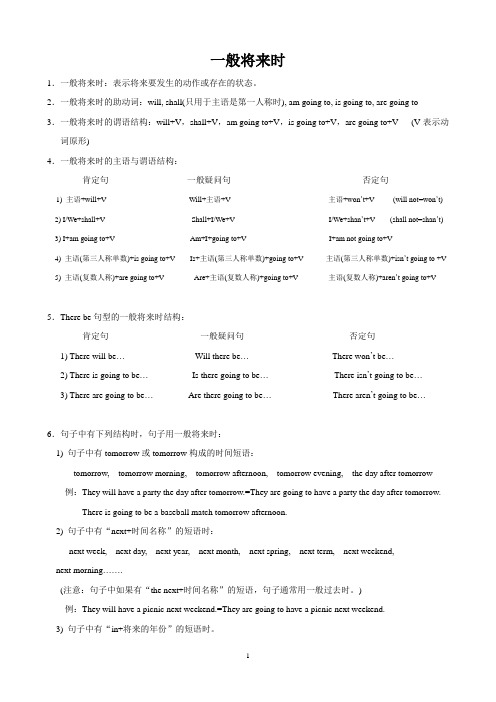
一般将来时1.一般将来时:表示将来要发生的动作或存在的状态。
2.一般将来时的助动词:will, shall(只用于主语是第一人称时), am going to, is going to, are going to3.一般将来时的谓语结构:will+V,shall+V,am going to+V,is going to+V,are going to+V (V表示动词原形)4.一般将来时的主语与谓语结构:肯定句一般疑问句否定句1) 主语+will+V Will+主语+V 主语+won’t+V (will not=won’t)2) I/We+shall+V Shall+I/We+V I/We+shan’t+V (shall not=shan’t)3) I+am going to+V Am+I+going to+V I+am not going to+V4) 主语(第三人称单数)+is going to+V Is+主语(第三人称单数)+going to+V 主语(第三人称单数)+isn’t going to +V5) 主语(复数人称)+are going to+V Are+主语(复数人称)+going to+V 主语(复数人称)+aren’t going to+V5.There be句型的一般将来时结构:肯定句一般疑问句否定句1) There will be…Will there be…There won’t be…2) There is going to be…Is there going to be…There isn’t going to be…3) There are going to be…Are there going to be…There aren’t going to be…6.句子中有下列结构时,句子用一般将来时:1) 句子中有tomorrow或tomorrow构成的时间短语:tomorrow, tomorrow morning, tomorrow afternoon, tomorrow evening, the day after tomorrow 例:They will have a party the day after tomorrow.=They are going to have a party the day after tomorrow.There is going to be a baseball match tomorrow afternoon.2) 句子中有“next+时间名称”的短语时:next week, next day, next year, next month, next spring, next term, next weekend,next morning…….(注意:句子中如果有“the next+时间名称”的短语,句子通常用一般过去时。
英语时态一般将来时知识清单总结及用法

英语时态一般将来时知识清单总结及用法1、一般将来时的结构2、一般将来时的结构变化3、知识要点一般将来时的用法(1) 表示将来的动作或状态,常与tomorrow,this evening. next Monday (week,month,year,in ten minutes,someday,in 2018,in the future 等单词或短语连用。
如:They say that the weather will be good tomorrow. 据说明天是好天气。
I shall have supper soon. 我要吃晚饭了。
There will be a class meeting this afternoon. 今天下午开班会。
He will come to see you next Monday . 他下周一会来看你。
(2) 表示即将发生的或最近打算进行的事,常用“be going to+动词原形”。
如:How are you going to spend your holiday ? 你们打算怎样度假?(3) 表示按计划即将发生的动作,常用go,come,start,move,leave等动词的进行时态。
如:He is coming in a minute . 他很快就来。
(4) 表示按计划要发生的事或征求对方意见,或表示安排、命令、预定好要做的事情,常用“be to+动词原形”。
如:The concert is to take place on Friday evening . 音乐会要在下星期五举行。
(5)表示即将发生的动作,或者表示立刻要做的事情,近在眼前的将来,常用“be about to+动词原形”。
如:Hurry up! The train is about to leave . 快点!火车马上要开了○(6) 一般将来时中be going to结构与will的异同点:①be going to结构和will的相同点:都表示将来的动作或状态。
一般将来时语法知识点
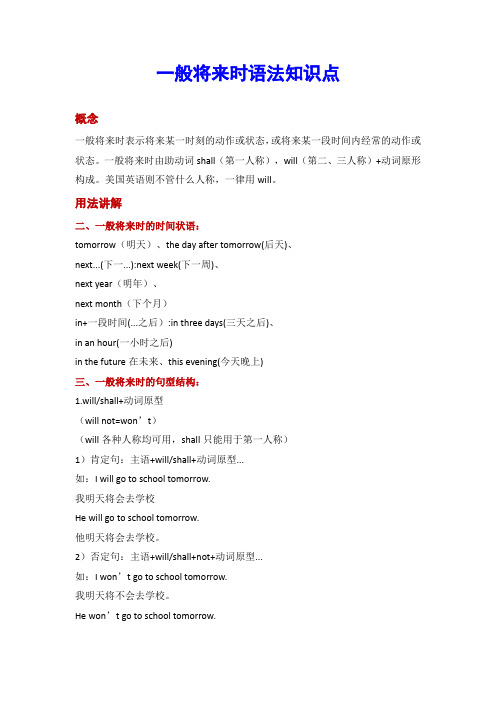
一般将来时语法知识点概念一般将来时表示将来某一时刻的动作或状态,或将来某一段时间内经常的动作或状态。
一般将来时由助动词shall(第一人称),will(第二、三人称)+动词原形构成。
美国英语则不管什么人称,一律用will。
用法讲解二、一般将来时的时间状语:tomorrow(明天)、the day after tomorrow(后天)、next...(下一...):next week(下一周)、next year(明年)、next month(下个月)in+一段时间(...之后):in three days(三天之后)、in an hour(一小时之后)in the future在未来、this evening(今天晚上)三、一般将来时的句型结构:1.will/shall+动词原型(will not=won’t)(will各种人称均可用,shall只能用于第一人称)1)肯定句:主语+will/shall+动词原型...如:I will go to school tomorrow.我明天将会去学校He will go to school tomorrow.他明天将会去学校。
2)否定句:主语+will/shall+not+动词原型...如:I won’t go to school tomorrow.我明天将不会去学校。
He won’t go to school tomorrow.他明天将不会去学校。
3)一般疑问句:Will/Shall+主语+动词原型...如:Will you go to school tomorrow?你明天要去学校吗?Will he go to school tomorrow?他明天要去学校吗?肯定回答:Yes,主语+will.如:Yes,I will.Yes,he will.否定回答:No,主语+will+not.如:No,I won’t.No,he won’t.4)特殊疑问句:特殊疑问词+will/shall+主语+动词原型... 如:What will you do tomorrow?你明天将会做什么?What will he do tomorrow?他明天将会做什么?2.be going to+动词原型1)肯定句:主语+be going to+动词原型...如:I am going to buy some books tomorrow.我明天打算去买一些书。
一般将来时知识点
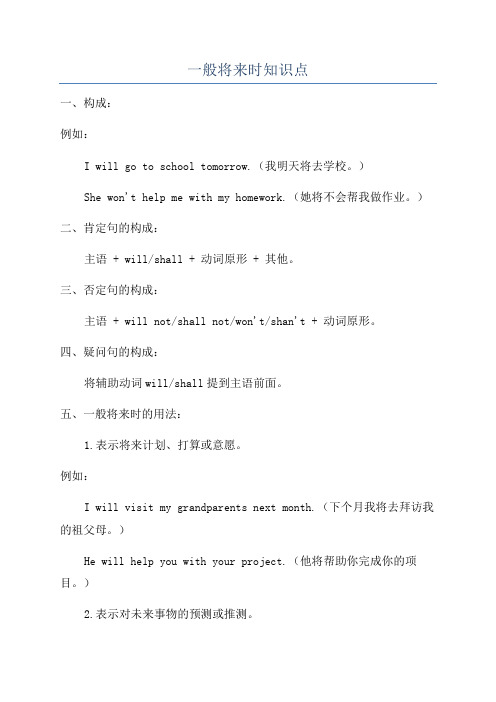
一般将来时知识点一、构成:例如:I will go to school tomorrow.(我明天将去学校。
)She won't help me with my homework.(她将不会帮我做作业。
)二、肯定句的构成:主语 + will/shall + 动词原形 + 其他。
三、否定句的构成:主语 + will not/shall not/won't/shan't + 动词原形。
四、疑问句的构成:将辅助动词will/shall提到主语前面。
五、一般将来时的用法:1.表示将来计划、打算或意愿。
例如:I will visit my grandparents next month.(下个月我将去拜访我的祖父母。
)He will help you with your project.(他将帮助你完成你的项目。
)2.表示对未来事物的预测或推测。
例如:It will rain tomorrow.(明天将会下雨。
)3.表示对将来事件的承诺或约定。
例如:They won't be late for the meeting.(他们不会迟到参加会议。
)4.表示习惯性、定期发生的动作或存在的状态。
例如:He will always watch TV after dinner.(他晚饭后经常看电视。
)They will be in Shanghai next week.(下周他们将在上海。
)5.用于条件句中,表示对未来情况的假设。
例如:If it rains tomorrow, we won't go hiking.(如果明天下雨,我们不会去远足。
)6.用于请求、建议、命令等语气中。
例如:Will you close the window?(请你关上窗户好吗?)You should study harder.(你应该更加努力学习。
)六、一般将来时的时间状语:表示将来的时间状语有:tomorrow(明天)、next week(下周)、in the future(将来)、soon(很快)、later(后来)、next year(明年)等。
一般将来时态知识点详解(初中英语专项复习) (4)
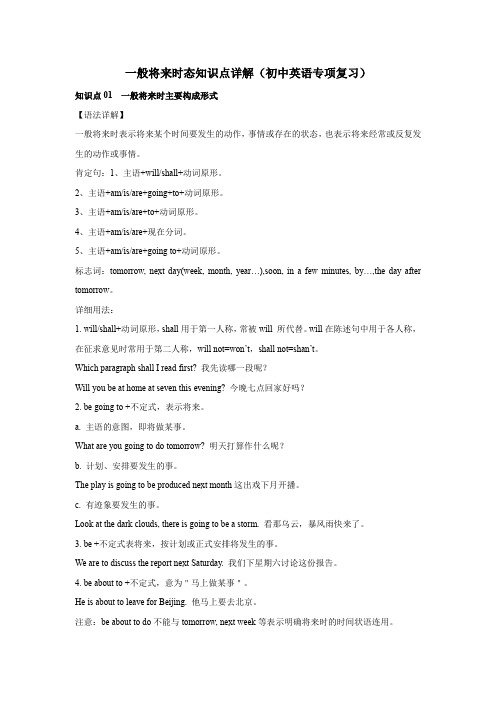
一般将来时态知识点详解(初中英语专项复习)知识点01 一般将来时主要构成形式【语法详解】一般将来时表示将来某个时间要发生的动作,事情或存在的状态,也表示将来经常或反复发生的动作或事情。
肯定句:1、主语+will/shall+动词原形。
2、主语+am/is/are+going+to+动词原形。
3、主语+am/is/are+to+动词原形。
4、主语+am/is/are+现在分词。
5、主语+am/is/are+going to+动词原形。
标志词:tomorrow, next day(week, month, year…),soon, in a few minutes, by…,the day after tomorrow。
详细用法:1. will/shall+动词原形,shall用于第一人称,常被will 所代替。
will在陈述句中用于各人称,在征求意见时常用于第二人称,will not=won’t,shall not=shan’t。
Which paragraph shall I read first? 我先读哪一段呢?Will you be at home at seven this evening? 今晚七点回家好吗?2. be going to +不定式,表示将来。
a. 主语的意图,即将做某事。
What are you going to do tomorrow? 明天打算作什么呢?b. 计划、安排要发生的事。
The play is going to be produced next month这出戏下月开播。
c. 有迹象要发生的事。
Look at the dark clouds, there is going to be a storm. 看那乌云,暴风雨快来了。
3. be +不定式表将来,按计划或正式安排将发生的事。
We are to discuss the report next Saturday. 我们下星期六讨论这份报告。
一般将来时与过去将来时知识点总结

一般将来时与过去将来时知识点总结一般将来时(Future Simple Tense)是指表示将来一些时间发生的动作或状态。
在英语中,一般将来时的构成使用助动词“will”或者“shall”加动词的原形。
以下是一般将来时的一些重要知识点总结。
1. 构成:一般将来时的基本结构是“will/shall + 动词原形”。
例如:I will go to the party tonight.(我今晚要去参加派对。
)3. 疑问形式:在一般将来时的疑问形式中,将助动词“will”或者“shall”放到句首。
例如:Will you help me with my homework?(你会帮我做作业吗?)4.用法:- 表示将来时间的动作或事件:I will visit my grandparentsnext weekend.(我下周末会去看望我的祖父母。
)- 表示打算或意愿:He will help you with the project.(他愿意帮助你完成这个项目。
)- 表示预测或推测:I think it will rain tomorrow.(我认为明天会下雨。
)5. 时间状语:一般将来时通常与一些表示将来时间的时间状语连用,例如:tomorrow(明天)、next week(下星期)、soon(很快)等。
过去将来时(Future in the Past)是指在过去一些时刻认为将来一些时间会发生的动作或状态。
主要用于叙述过去的故事或描述过去的情况。
以下是过去将来时的一些重要知识点总结。
2. 否定形式:在过去将来时的否定形式中,将助动词“would”或者“should”和动词原形之间加上“not”。
例如:She said she wouldnot be able to attend the meeting.(她说她不能去参加会议。
)3. 疑问形式:在过去将来时的疑问形式中,将助动词“would”或者“should”放到句首。
一般将来时知识点

一般将来时知识点一般将来时是英语中常用的一种时态,用来表示将来发生的动作或状态。
在句子中,一般将来时通常由助动词"will"或"shall"加动词原形构成。
除了表示将来的动作或状态外,一般将来时还可以表示决心、意图、预测、承诺以及请求等不同的语义。
下面是一些一般将来时的知识点:1.一般将来时的基本结构:主语 + will/shall + 动词原形+ …例如:- I will visit my grandparents tomorrow.(我明天会去看望我的祖父母。
)- He shall help you with the project.(他会帮助你完成这个项目。
)2.一般将来时的否定形式:主语 + will not/shall not + 动词原形+ …例如:- They will not arrive on time.(他们不会准时到达。
)- She shall not attend the meeting.(她不会参加会议。
)3.一般将来时的疑问形式:将助动词"will"或"shall"提前到句子的主语之前,并且将句末的问号加在句子结束处。
例如:- Will you come to the party?(你会来参加聚会吗?)- Shall we go for a walk?(我们去散步好吗?)4.一般将来时与时间状语的搭配:一般将来时经常和表示将来时间的状语词或短语一起使用,如:tomorrow(明天)、next week(下周)、in the future(在未来)等。
例如:- We will have a meeting tomorrow.(我们明天有个会议。
)- She shall complete the report next week.(她下周会完成这份报告。
)5.一般将来时表示打算、意图:一般将来时也经常用来表示打算、意图或计划要做某事。
一般将来时的知识点归纳整理
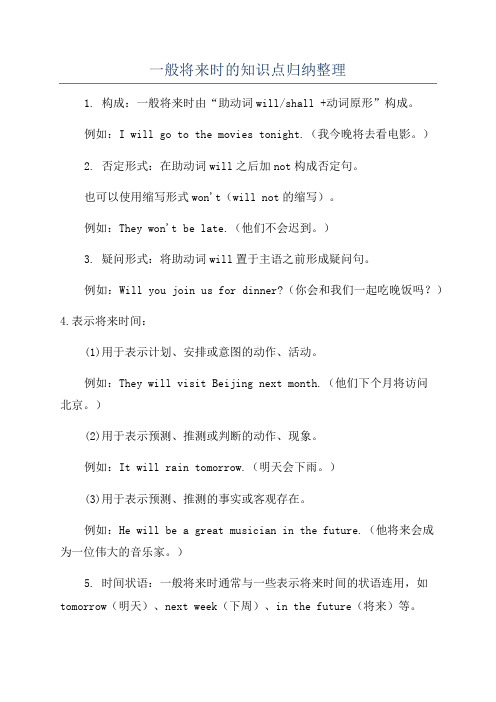
一般将来时的知识点归纳整理1. 构成:一般将来时由“助动词will/shall +动词原形”构成。
例如:I will go to the movies tonight.(我今晚将去看电影。
)2. 否定形式:在助动词will之后加not构成否定句。
也可以使用缩写形式won't(will not的缩写)。
例如:They won't be late.(他们不会迟到。
)3. 疑问形式:将助动词will置于主语之前形成疑问句。
例如:Will you join us for dinner?(你会和我们一起吃晚饭吗?)4.表示将来时间:(1)用于表示计划、安排或意图的动作、活动。
例如:They will visit Beijing next month.(他们下个月将访问北京。
)(2)用于表示预测、推测或判断的动作、现象。
例如:It will rain tomorrow.(明天会下雨。
)(3)用于表示预测、推测的事实或客观存在。
例如:He will be a great musician in the future.(他将来会成为一位伟大的音乐家。
)5. 时间状语:一般将来时通常与一些表示将来时间的状语连用,如tomorrow(明天)、next week(下周)、in the future(将来)等。
例如:She will start her new job next Monday.(她下周一将开始新的工作。
)6.与其他时态的关系:(1)过去将来时:在过去的其中一时间,表示在那个时间将来发生的动作。
例如:When I saw Tom, he said he would help me.(当我看到汤姆的时候,他说他会帮助我。
)(2)现在进行时表示将来:用现在进行时表示按计划或安排即将发生的动作。
例如:We are leaving for Paris tomorrow.(我们明天动身去巴黎。
)7.注意事项:(1)一般将来时不能用于表示客观真理、永久性事实或习惯性动作。
- 1、下载文档前请自行甄别文档内容的完整性,平台不提供额外的编辑、内容补充、找答案等附加服务。
- 2、"仅部分预览"的文档,不可在线预览部分如存在完整性等问题,可反馈申请退款(可完整预览的文档不适用该条件!)。
- 3、如文档侵犯您的权益,请联系客服反馈,我们会尽快为您处理(人工客服工作时间:9:00-18:30)。
一般将来时态的知识点整理
关于一般将来时态的知识点整理
一、概念:
表示将要发生的动作或存在的状态及打算、计划或准备做某事。
二、结构
基本结构:主语+am/is/are+going to + do;will/shall + do.
否定形式:am/is/are not going to do ;will/shall not do。
一般疑问句:be放于句首;will/shall提到句首。
三、用法
1.一般将来时表示将要发生的动作或情况。
例如:I will(shall) arrive tomorrow.我明天到。
(主语是第一人称时最好用shall)
Will you be free tonight?
你今晚有空吗?
We won’t (shan’t) be busy this evening.
我们今晚不忙。
2.在一般将来时的句子中,有时有表示将来时间的状语,有时没有时间状语,这时要从意思上判断是否指未来的'动作或情况。
例如:Will she come?
她(会)来吗?
3.在以第一人称I或we作主语的问句中,一般使用助动词shall,这时或是征求对方的意见,或是询问一个情况(b):
a. Where shall we meet?
我们在哪儿碰头?
b. Shall we have any classes tomorrow?
明天我们有课吗?
3.be going to+ 动词原形
a.表示计划、打算、准备做的事。
例如:
We are going to put up a building here.
我们打算在这里盖一座楼。
How are you going to spend your holidays?
假期你准备怎样过?
b.表示即将发生或肯定要发生的事。
例如:
I think it is going to snow.
我看要下雪了。
练习题:
1.I ____ just ____ (finish) my homework.
2.He ____ (go) to school on foot every day.
3. ____ you ____ (find) your science book yet?
4.If it ____ (be) fine tomorrow, I’ll go with you.
5.She doesn’t like the children ____ (play) in the room.
6.The students ____ (read) English when the teacher came in.
7.Look! The monkey ____ (climb) the tree.
8.My mother ____ (come) to see me next Sunday.
9.How many sheep ____ you ____ (get)? Only one.
10.I’ve lost my pen. ____ you ____ (see) it anywhere?。
